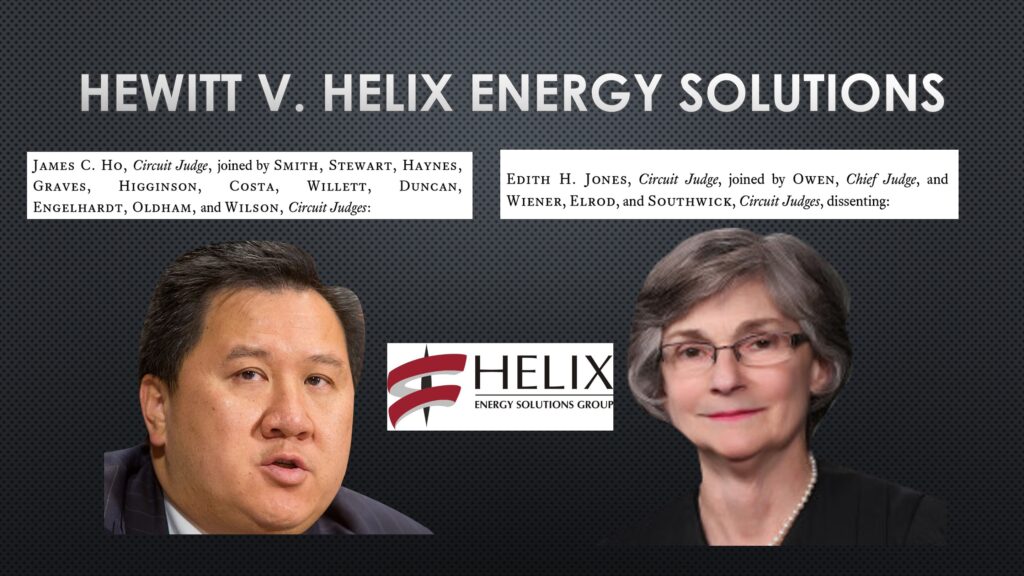Justice Kagan Affirms En Banc Fifth Circuit
On Wednesday, the Supreme Court decided Helix Energy Solutions Group, Inc. v. Hewitt. The facts of the case are straightforward enough: does a "tool-pusher" who makes more than $200,000 per year, while working on an offshore oil rig, qualify for overtime pay? The law is, admittedly, complex. There is an intricate statutory and regulatory framework at play. I won't try to summarize those twists and turns here. But underlying these legal issues is a normative question: should someone making so much money be eligible for overtime? How would a liberal vote here? How would a conservative vote here?
By a 6-2 vote, the Supreme Court ruled that the employee was not paid on a "salary basis," and was thus eligible for overtime. Justice Kagan wrote a characteristically lucid decision parsing a difficult textual conflict. It is a breeze to read. Justice Gorsuch would have DIG'd the case (more on later). Justice Kavanaugh wrote a short dissent, which was joined by Justice Alito (more on that later as well).
I have been tracking this Texas case for several years as it wound its way through the Fifth Circuit. And I think it is worthwhile to note that six Justices affirmed a a decision of the en banc Fifth Circuit. And that opinion was written by--so we're told--one of the biggest hacks in the judiciary: Judge Jim Ho. Indeed, the Hewitt en banc majority had a heterodox makeup: Ho, Smith, Stewart, Haynes, Graves, Higginson, Costa, Willett, Duncan, Engelhardt, Oldham, and Wilson. In dissent were Judges Jones, joined by Owen (now Richman), Wiener, Elrod, and Southwick. The Fifth Circuit truly is the most interesting circuit. I flagged this case in my State of the Fifth Circuit Address from last year.

Justice Kagan favorably quotes Ho's opinion:
So as the Court of Appeals remarked, nothing about today's decision should "come as a surprise." 15 F. 4th, at 296.
While Kagan referred to Jones's dissent as "more expansive":
Six judges dissented in two opinions. The more expansive dissent argued that Hewitt's compensation "satisfied the salary basis test" of §602(a). Id., at 307 (opinion of Jones, J.). It further concluded that §604(b) is not applicable at all to high-income employees— i.e., those falling within the HCE rule because they earnover $100,000. See id., at 309.
Judge Ho departed from Judge Jones, whom I labelled as the Court's standard measure of judicial conservatism. Perhaps Justice Kagan's affirmance of Judge Ho's opinion bolsters that departure in this case, where judicial conservatism and textualism are in tension.
Finally, I would like to flash-back to Judge Wiener's en banc dissent:
I concur in Judge Jones's thorough dissent. But, as the panel dissenter and one of today's en banc dissenters, I write separately—and at times repetitively—to emphasize how common sense and a reasonable reading of the law combine to demand a result opposite the one reached originally by the panel majority and today by the en banc majority. Frankly, I cannot fathom how a majority of the active judges of this court can vote to require Helix to pay overtime to Hewitt, the supervisor of 12 to 13 hourly, hands-on workers, when he was already paid more than twice the cap of $100,000 per annum for overtime eligibility. And, if that is not incomprehensible enough, keep in mind that Hewitt worked for Helix no more than half of the days during the calendar years at issue!
I hope Judge Wiener can now "fathom" how six Justices of the Supreme Court, conservative and liberal alike, can reach this conclusion.
